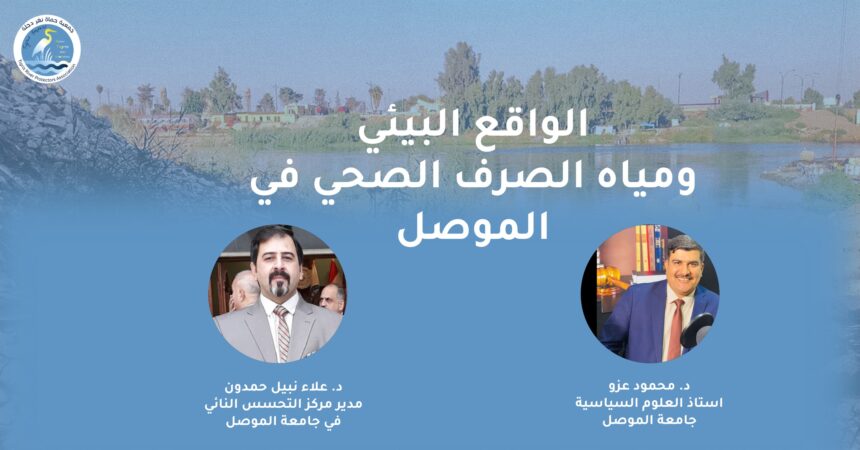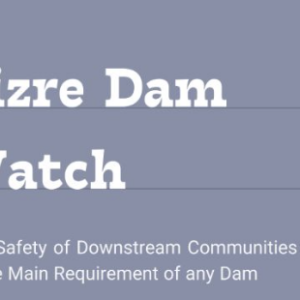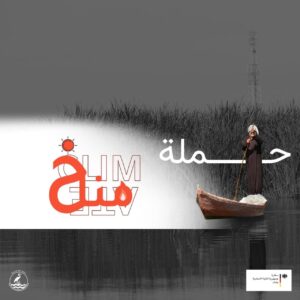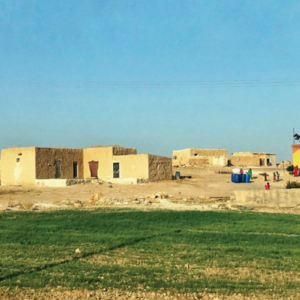The city of Mosul that suffered from war for three years between the years 2014 to 2017, during this period, it suffered a comprehensive destruction that did not stop at the infrastructure and service facilities only, but it also affected the elements of the environmental balance, including water, as the water pollution disaster is one of the most serious disasters that befell the city of Mosul and the cities that follow on the river line, in light of the government’s silence regarding this problem.
For this reason Humat Dijlah hosted a webinar titled Environmental Reality and Sewage Water in Mosul, as a large number of people interested in environmental and pollution issues participated in the session on the digital platform of the Zoom.us application.
In the beginning the session talked about one of the most important environmental problems that the Tigris River suffers from in the city of Mosul, Represented by the lack of sewage treatment plants, as it is thrown directly into the riverbed, and the impact of these wastes on the river and the biological system associated with it were discussed. As stated by Dr. Alaa Nabil Saadoun (Director of the Remote Sensitivity Center at the University of Mosul), according to scientific and academic studies conducted by the Center on pollution in the Tigris River. The places that witness a high percentage of pollutants in Mosul are the Danfali River and the Al-Khawser River, which are two of the largest seasonal tributaries of the Tigris River in Mosul. As these rivers have become major sources of pollution in the Tigris River, due to the sewage water, industrial and toxic chemical wastes, in addition to the car’s waste of oils, grease, and other kinds of waste, that has been dumped by some factories and car wash companies. Dr. Alaa also discussed the possibility of investing the Al-Khawser River and converting it from a harmful and polluted environment containing non-drinkable water to a tourist place and a safe and clean environment within the city.
Speaking about the effectiveness of the laws and instructions in force that contribute to the protection of the environment and rivers and put an end to transgressing the taboos of the river, Professor of Political Science at the University of Mosul, Dr. Mahmoud Ezzo, explained, the environmental file is not among the priorities of local policy makers, and the level of their implementation of these laws is cosmetic, patchwork, and not serious.as it is usually only on paper or it may be implemented with serious errors. The doctor pointed out that the reason for this is due to a general weakness in the environmental culture on the part of society first and government institutions secondly because government institutions are in fact a reflection of the nature of society.
In conclusion, Dr. Alaa praised the need to work on raising the level of environmental culture for the Iraqi citizen, and for Mosul in particular, and to work to spread this culture among members of society through educational and educational institutions, in addition to awareness campaigns and voluntary work to restore the banks of the Tigris River and preserve it from pollutants and drought. Dr. Mahmoud added that awareness campaigns, advocacy campaigns, collecting signatures and holding sessions with specialists are among the necessary steps to put pressure on government agencies towards approving government policies and procedures aimed at protecting the environment and water from these disasters and environmental risks, in addition to the need to pressure local policy makers to activate Laws related to the protection of the environment and water.
It is worth noting that this session is part of a series of webinars organized by Humat Dijlah to shed light on issues related to the environment and water reality of the cities of the Tigris and Euphrates rivers through the use of electronic platforms.
To Watch The Entire Webinar on YouTube HERE.





Leave a Reply